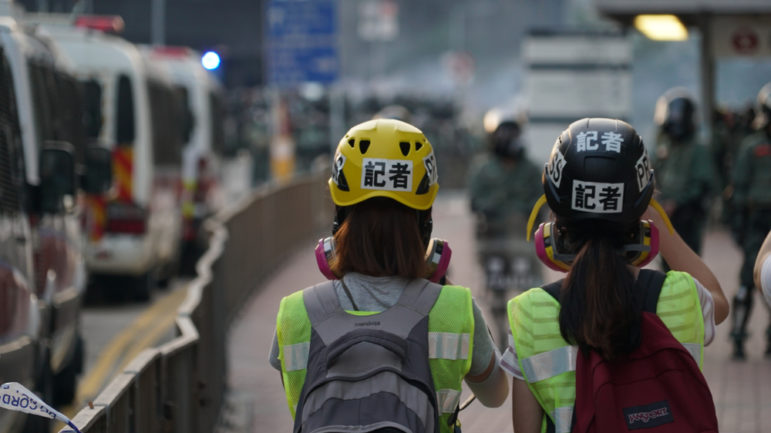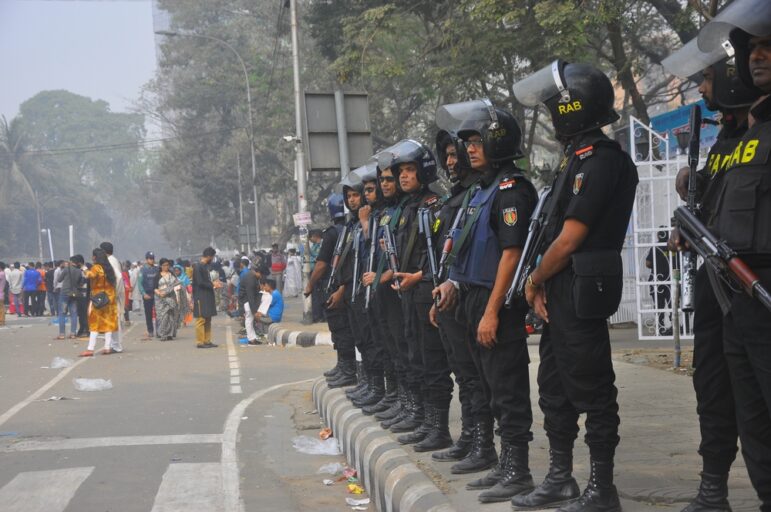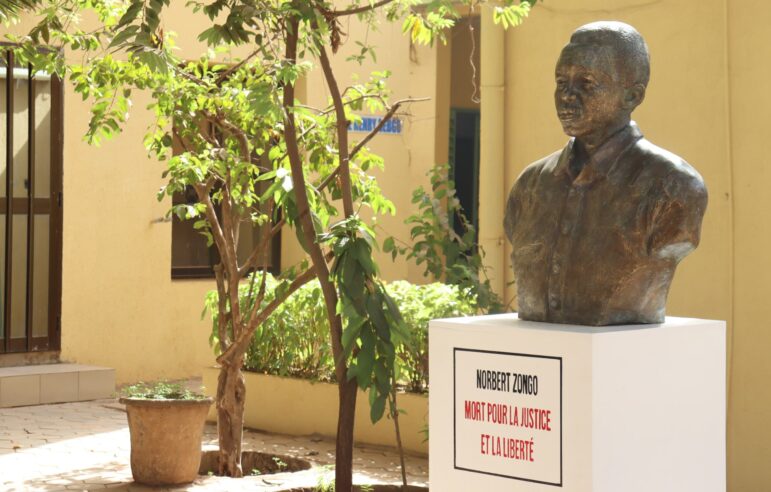

Kowloon, Hong Kong - November 17, 2019: Two women in the press wearing helmets, gas masks and yellow vests watch riot police perform a siege on protestors occupying the polytechnic university. Image: Shutterstock
Understanding the Impact of Journalism Inside Authoritarian Regimes
Read this article in

Two women in the press wearing helmets, gas masks, and vests watch riot police perform a siege on protestors occupying the polytechnic university in Kowloon, Hong Kong. Image: Shutterstock
I used to be a columnist at the largest newspaper in Venezuela. I also hosted my own daily radio show and founded a newsletter-based media organization, Arepita. My journalism should have helped strengthen democracy, I thought, as it shined a light on issues in society.
Yet in the decade since I graduated from journalism school, my country has become an autocratic regime that violates human rights and jails journalists. It often feels like all of my work was for naught; at the least, I find myself unsure how to assess its importance.
It is simpler to measure the impact of journalists’ reporting in open, democratic countries. In these contexts, institutions and those in power are more likely to reform their ways in response to evidence of corruption or mismanagement. In authoritarian countries — in the absence of rule of law and democratic processes — these actors don’t feel this same pressure. It can be discouraging, as the status quo prevails. On top of this, media that dares publish reporting critical of the government are more likely to come under fire.
No matter how much evidence of corruption or wrongdoing journalists in these settings may uncover, there’s a sense among us and the general public that little will change.
Despite the challenges and this sentiment, however, journalists can still make a positive difference. Their impacts may just emerge in less traditional ways.
Barriers to Journalism
Conditions for journalists in authoritarian countries are challenging and often dangerous. Access to information is more limited, and journalists may experience censorship, persecution, and threats to their life.
In Russia, for example, the invasion of Ukraine has led to new legislation restricting press freedom. “The new law that Putin signed this March punishes spreading non-Kremlin-approved information with up to 15 years in prison. This means that covering the war in Ukraine is practically illegal for Russian reporters,” said Irina Scherbakova, a Russian journalist who recently immigrated to Latvia.
The sources that journalists rely on are also often in more danger under authoritarian regimes. José and Leo, street vendors in Havana, Cuba, had their vending licenses revoked for giving statements in a report on self-employed workers. (José and Leo’s last names were not published in the original story.) “It is very difficult to have sources in Cuba, precisely because they are also thinking about reprisals,” noted Abraham Jiménez Enoa, the report’s author, now in exile in Spain.
In authoritarian contexts like these it is difficult for funders to measure the impact of the journalism they support, as typical performance indicators such as readership, engagement, and institutional reform are typically harder to track. This can affect the flow of money to support journalists and newsrooms in these settings.
“Measuring the impact of a story by the number of readers does not work here. The blockades maintained by different internet service providers around digital media limit the readership you can have,” said Patricia Marcano, editorial coordinator for Venezuelan investigative journalism media outlet Armando.info.
Impacts of Journalism
In light of these challenges, journalists and donors need to widen their understanding of the less traditional ways journalism generates impact. It can still help document human rights violations, raise the profile of local NGOs, inform legal action in other countries, build community across borders, and leave a record for future generations.
Documenting Human Rights Violations
Armando.info found many irregularities in the exercise of justice between 2000 and 2019 in Venezuela, after reviewing a database with information about almost 6,000 judges in the country. They found that lack of independence and corruption in the judiciary are major obstacles faced by people with legal cases against them. The ensuing report was used as a reference by the Human Rights Council’s independent fact-finding mission and in the 2020 annual report of the Inter-American Commission on Human Rights to support victims demanding justice.
Thanks to this and other reports from independent media, today we know that Venezuela had one of the worst rule of law indexes in 2021, according to the World Justice Project. Having quantifiable evidence of this helps people in unjust legal proceedings build stronger cases to bring before international organizations such as the International Criminal Court or the Inter-American Court of Human Rights. It also assures them that they are one of many struggling against a corrupt system.
Raising the Profile of Local NGOs
Journalism in authoritarian regimes can raise awareness for local nonprofits and civil society organizations to act. In Russia, the independent outlet Meduza published a story last year about Roza Khalishkhova, a woman who sued the Russian ministry of defense after her son disappeared during the first Chechen war. She survived being tortured by Chechen fighters while trying to find him.
Civil rights group Pravo Materi helped Khalishkhova and other families whose sons died during their military service. “I told her story and I told about Pravo Materi,” said Scherbakova, the report’s author. “Then people started sharing information about them and donating to Pravo Materi.”
Informing Legal Action
Journalism can also inform legal action in other countries. In 2017, Armando.info published stories on irregularities in food imports in Venezuela, implicating businessman Alex Saab. Saab sued for defamation, and several journalists from the media outlet went into exile to avoid being attacked.
Thanks in large part to the evidence gathered by Armando.info, the US Department of Justice later filed charges against Saab and another Colombian businessman for allegedly laundering up to US$350 million that they obtained through Venezuela’s exchange control system. Saab was arrested during a plane stop in Cape Verde when traveling from Venezuela to Iran, and today awaits trial in the US.
Building Community Across Borders
Independent media can help migrants and displaced refugees keep up with the news in their countries of origin too. “El Estornudo is blocked in Cuba, and to enter the website you need a VPN. Almost all their readers are outside Cuba,” said Jiménez Enoa, the site’s co-founder.
Even if there is heavy censorship, there are always loopholes information can slip through, to connect those who left and those who stayed behind. In July 2021, tens of thousands of Cubans took to the streets in what were the largest anti-government protests in the country in decades. The demonstrations were a response to food and medicine scarcities, as well as the government’s response to the COVID-19 pandemic. Reporting by independent media informed Cubans residing abroad about the protests, inspiring sister demonstrations in front of Cuban embassies in other countries.
Leaving a Record for Future Generations
Finally, with authoritarian governments often determined to push their convenient versions of events as factual, journalism can also act as a space to leave a “first rough draft of history.” Even if reporting doesn’t have an immediate impact, it can leave a historical record that can influence the actions of future generations.
Reporting on the Tiananmen Square protests and massacre in 1989 is a strong example of this. “There were great pictures showing one man standing in front of the tank; journalists documented the sounds of the use of weapons,” said Bao Choy, a journalist and video producer in Hong Kong. “We have all these memories stuck to our minds that the Communist Party could be very brutal and could violate human rights. And I think that memory played a role for Hong Kong people to fight for their own democracy in the following decades.”
Today, journalists and their funders need to widen their understanding of the impacts of journalism, and the non-traditional channels through which quality, independent reporting effects change. In an increasingly authoritarian world, doing so can help motivate and support a new generation of journalists seeking to make an impact in their countries, no matter the odds stacked against them.
This story was originally published on IJNet, and is reprinted here with permission.
Additional Resources
Why Journalists in Autocracies Should Report as If They’re in a Democracy
How Armando.info’s Exiled Reporters Keep Reporting on Venezuela
Understanding the Authoritarian’s Playbook: Tips for Journalists
 Dariela Sosa is a monitoring, evaluation and learning consultant for the International Center for Journalists (ICFJ). Originally from Venezuela, Dariela is a journalist currently based in Argentina.
Dariela Sosa is a monitoring, evaluation and learning consultant for the International Center for Journalists (ICFJ). Originally from Venezuela, Dariela is a journalist currently based in Argentina.











